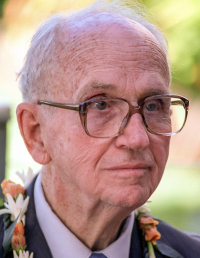On this date in 1907, writer James Albert Michener was born in New York City. An orphan, he spent his first few years at the Bucks County Poorhouse in Doylestown, Pa, until adopted by Edwin and Mabel Michener. As Quakers, they believed in social activism and took in several orphaned children. The family was extremely poor, moving often during Michener’s childhood. He felt that this gave him a strong sense of character, an acceptance of what life really looked like.
In an interview with the American Academy of Achievement, Michener stated, “I think the bottom line … is that if you get through a childhood like mine, it’s not all bad. … The sad part is, most of us don’t come out.” Michener credited his mother for reading to him every night. “I had all the Dickens and Thackeray and Charles Read and Sinkiewicz and the rest before I was the age of seven or eight.”
Michener realized at a young age that there was a bigger world to see and, when he was 14, started hitchhiking around the U.S. with only 35 cents in his pocket: “I went everywhere, and I did it on nothing.” This interest in the world lasted a lifetime. Michener received a scholarship to study at Swarthmore College, graduating with highest honors. He studied at St. Andrew’s University in Scotland, returned home to teach, and then went on to become assistant visiting professor of history at Harvard University.
At the onset of World War II, Michener joined the Navy and was stationed in the Pacific. In 1947 he wrote his first book, Tales of the South Pacific, relating some of his experiences in the Solomon Islands, for which he received a Pulitzer Prize. The story was subsequently turned into the Rodgers and Hammerstein musical, “South Pacific,” which also received a Pulitzer.
Spending many years living abroad and writing, he thoroughly researched whichever culture he was living in before he started writing. Among his books are: The Bridges at Toko-Ri, Sayonara, The Source (about religion), Hawaii, Chesapeake, The Covenant, Space, Poland, Texas and Alaska. Michener was also active in public service, was a member of the Advisory Council to NASA and was cultural ambassador to various countries. He considered himself to be a humanist, and during the 1960s spoke out, amid the concerns raised regarding John F. Kennedy’s Catholicism: “I’ve fought to defend every civil right that has come under attack in my lifetime. … I’ve stood for absolute equality, and it would be ridiculous for a man like me to be against a Catholic for President.” (The Historian, 2001)
Michener won several honors and awards, among them the Presidential Medal of Freedom, America’s highest civilian award. He was married three times — to Patti Koon from 1935 to 1948, when they divorced, to Vange Nord from 1948 to 1955, when they divorced, and to Mari Yoriko Sabusawa from 1955 to 1994, when she died.
He died of kidney disease at age 90 in Austin, Texas. (D. 1997)
PHOTO: Michener in 1991 at the 50th anniversary observance of the Japanese attack on Pearl Harbor.


